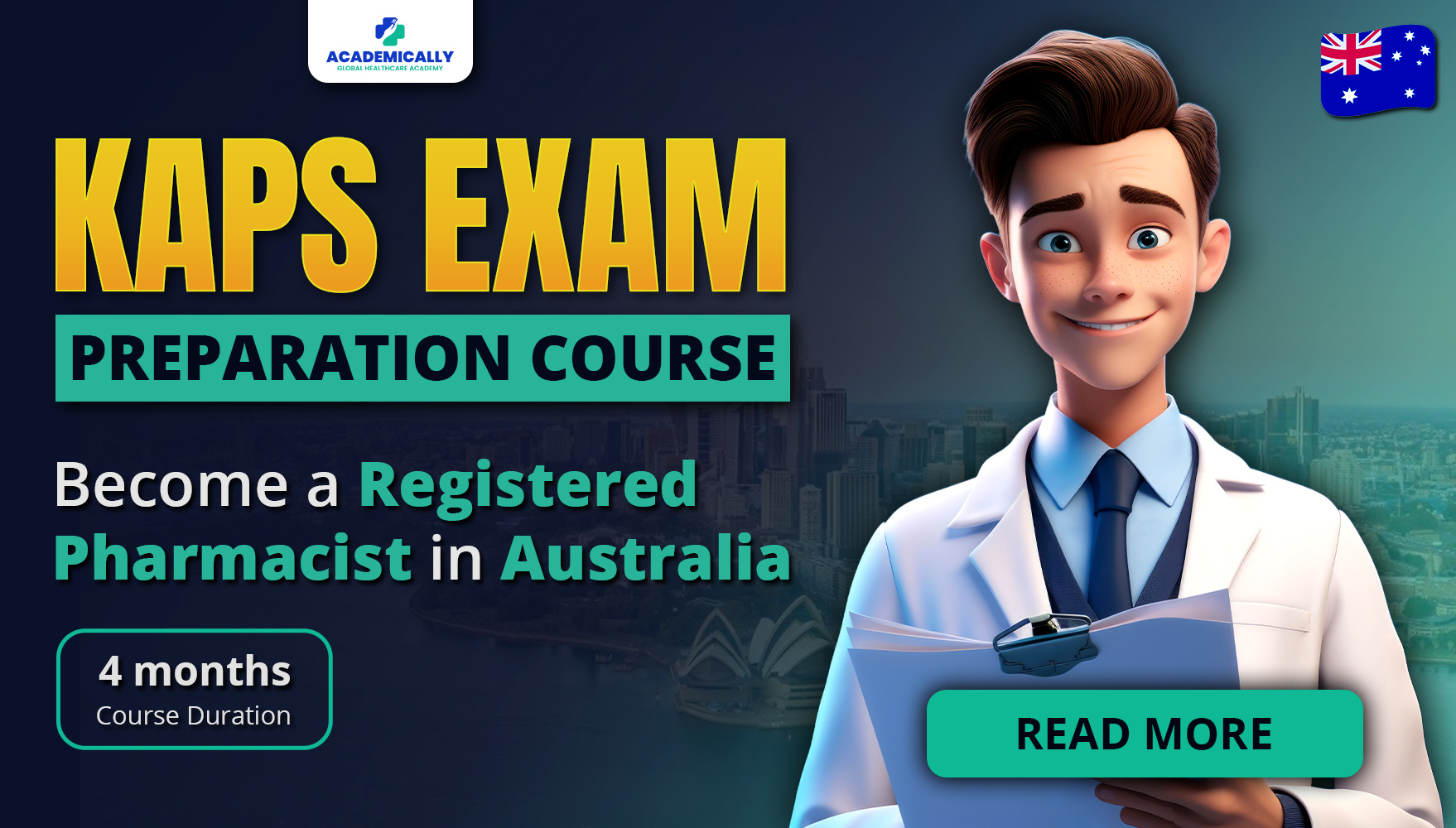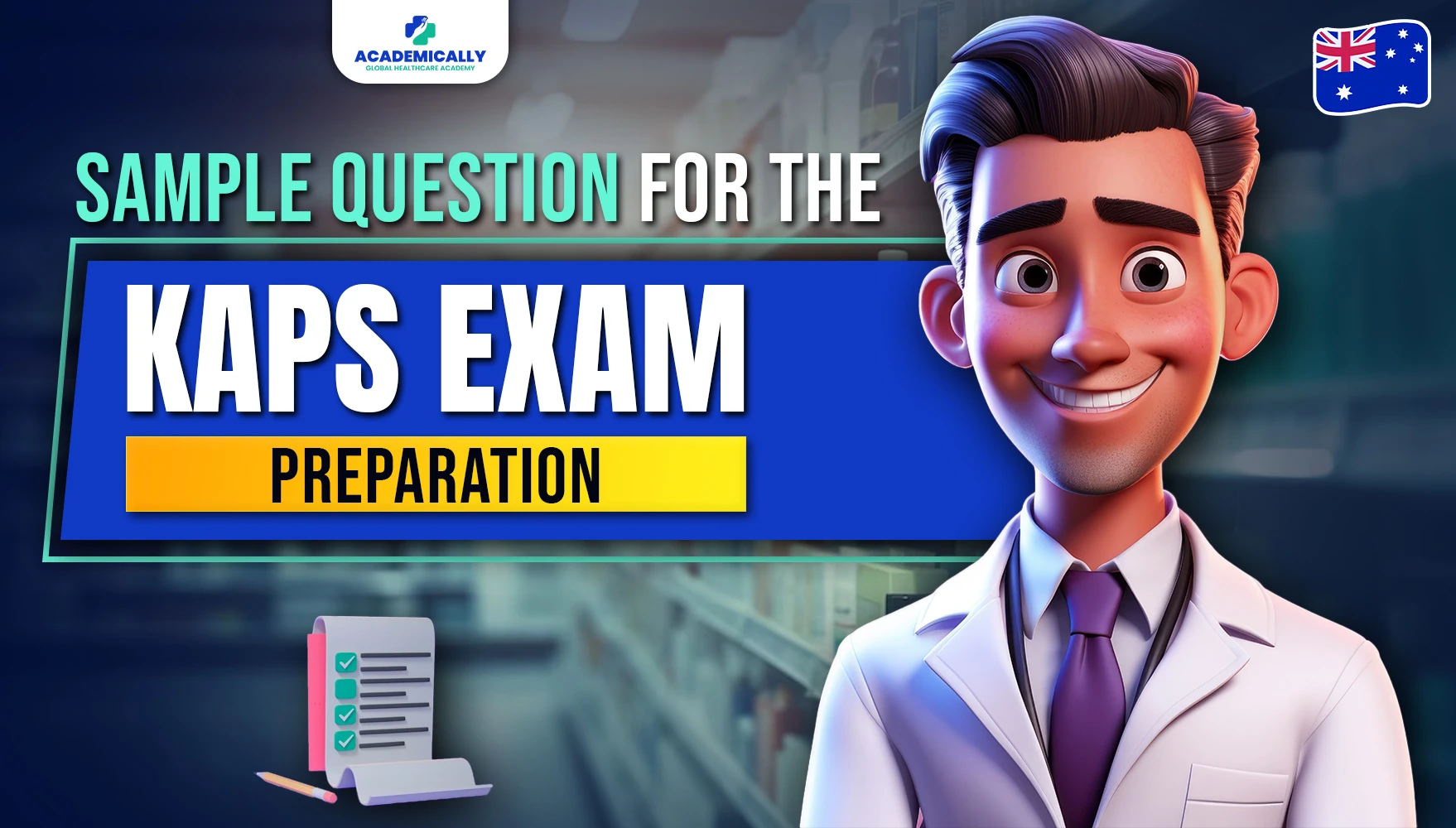To prepare for your KAPS exam in just 45 days, click here.
A Closer Look at The KAPS Exam Syllabus
The KAPS exam evaluates your knowledge in the following areas:
- Pharmaceutical Chemistry
- Physiology and Pharmacology
- Pharmaceutic
- Therapeutics
There will be 200 multiple-choice questions and a total of four hours to complete the exam. The passing score is 50% and there is no negative marking.
KAPS Exam Sample Questions
Now, let us dive into some of the sample questions of the KAPS exam.
KAPS Paper 1 Sample Questions
1. How does colchicine relieve symptoms of an acute gout attack?
A. Blocking PGE2 formation
B. Blocking uric acid formulation
C. Inhibiting neutrophil infiltration
D. Increasing uric acid excretion
2. What is the main effect of vasopressin?
A. To increase blood pressure, increasing formation of nephric filtrate
B. To cause active transport of urea and uric acid from renal blood into tubules
C. To inhibit aldosterone action
D. To cause reabsorption of water
3. What is another acceptable name for isopropyl alcohol?
A. Methanol
B. 1,2-ethanediol
C. 2-propanol
D. 1-pentanol
4. Men with diabetes are at significantly higher risk of developing which ONE of the following conditions?
A. Renal stenosis
B. Macular depigmentation
C. Testicular cancer
D. Erectile dysfunction
5. What is a nosocomial infection?
A. Acquired in a medical facility
B. Transmitted by respiratory droplets
C. Transmitted via contaminated water
D. Affects mainly school-aged children
6. Which ONE of the following is NOT a long-term complication of diabetes?
A. Retinopathy
B. Microangiopathy
C. Paralytic ileus
D. Neuropathy
7. Which pair below are examples of monosaccharides?
A. Glucose and glycerine
B. Maltose and sucrose
C. Fructose and glucose
D. Lactose and galactose
8. What drug can cause gingival hyperplasia after long-term treatment?
A. Irbesartan
B. Hydrochlorothiazide
C. Propranolol
D. Nifedipine
9. Which ONE of the following drugs is LEAST likely to need a dosage adjustment in a patient with reduced renal function?
A. Haloperidol
B. Metformin
C. Digoxin
D. Tobramycin
10. What is the morphology of a normal erythrocyte?
A. Non-nucleated, biconcave disc
B. Binucleated cell
C. Non-nucleated convex disc
D. Nucleated biconcave disc
KAPS Paper 2 Sample Questions
1. Which ONE of the following drugs is generally avoided in children under 12 years of age?
A. Norfloxacin
B. Amoxicillin
C. Azithromycin
D. Rifampicin
2. A laxative is MOST likely to be used to manage a common adverse effect of which medication?
A. Piroxicam
B. Oxycodone
C. Cefalexin
D. Dexamethasone
3. Which ONE of the following drugs is the LEAST appropriate for acute treatment of migraine?
A. Oxycodone
B. Ibuprofen
C. Sumatriptan
D. Aspirin
4. Why is lignocaine unsuitable for oral administration?
A. It is not absorbed from the gastrointestinal tract
B. It undergoes significant first pass metabolism in the liver
C. It is decomposed by gastric acid
D. It binds to mucoproteins in the intestine
5. Which ONE of the following gram-positive organisms and anaerobes is resistant to treatment by the broad spectrum antibiotic clindamycin?
A. Staphylococcus saprophyticus
B. Clostridium perfringens
C. Haemophilus influenzae
D. Actinomyces
6. Which ONE of the following drugs is NOT a racemate?
A. Ibuprofen
B. Citalopram
C. Esomeprazole
D. Dicloxacillin
7. Which ONE of the following drugs does NOT cause syndrome of inappropriate antidiuretic hormone (SIADH)?
A. Cyclophosphamide
B. Chlorpromazine
C. Carbamazepine
D. Captopril
8. Which suppository base is immiscible with bodily fluids?
A. Gelatine
B. Polyethylene glycol
C. Cocoa butter
D. Macrogol
9. Fever, malaise and blistering of the skin and mucous membranes when taking carbamazepine is MOST likely to be due to which ONE of the following?
A. Anaphylactic reaction
B. Serotonin syndrome
C. Type-1 hypersensitivity reaction
D. Stevens-Johnson syndrome
10. Therapeutic anticoagulation with unfractionated heparin (UFH) requires monitoring of which ONE of the following?
A. International Normalised Ratio (INR)
B. Antifactor Xa
C. Activated partial thromboplastin time (aPTT)
D. Prothrombin time

Conclusion
The journey towards a successful overseas pharmacy career in Australia often begins with the KAPS exam. Aspiring pharmacists, whether fresh graduates or seasoned professionals, can leverage this opportunity to showcase their knowledge, skills, and clinical competence in the diverse landscape of pharmaceutical sciences.
The KAPS exam, divided into two parts, serves as a comprehensive evaluation of key areas such as pharmaceutical chemistry, physiology, pharmacology, pharmaceutics, and therapeutics. Success in this exam not only opens doors to registration in Australia but also signifies a commitment to upholding high standards within the healthcare system.
To excel in the KAPS exam, it is crucial to adopt a efficient preparation strategies. Practising with past papers provides invaluable insights into the exam format, while a thorough review of core concepts ensures a strong foundation in pharmaceutical sciences.
But for those aspirants who dream of cracking this important exam on their first attempt, Academically has come up with a comprehensive KAPS exam preparation course that trains the aspirants, guide them through the entire process from the documentation to the migration, and assistance in the job-hunting process. Reach out to us today to get your journey started.
Fill up this form for a free one on one counselling session.





